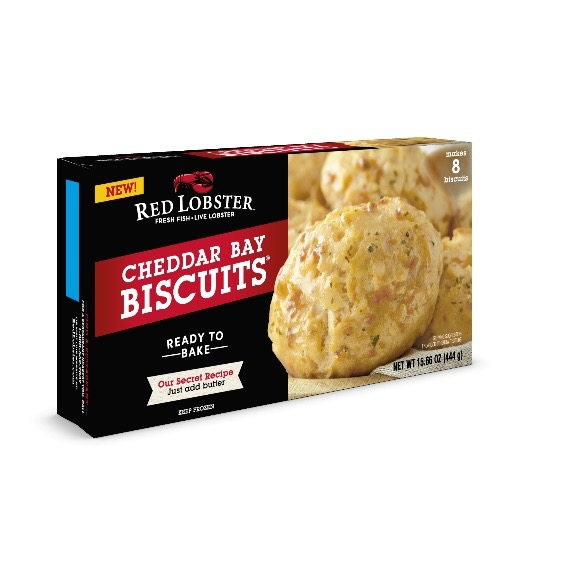In the age of convenience, restaurants and foodservice operators that don’t offer takeout and/or delivery, especially during the ongoing COVID-19 pandemic, will likely fall by the wayside. But some take it a step further by launching their most popular products in retail — the latest of which is Red Lobster. Earlier this week, the seafood chain announced it would be launching a frozen, ready-to-bake version of its famous Cheddar Bay Biscuits exclusively in Walmart stores.
With no mixing or prep-work required, the chain says the frozen biscuits “go from box to baking sheet to table in less than 30 minutes.” The biscuits join the already extensive lineup of Red Lobster’s bake-at-home products, including Gluten-Free Cheddar Bay Biscuit Mix, Rosemary and Garlic Parmesan Mix and Traditional Mix, all available in grocery stores nationwide.
Red Lobster caught on to the restaurant to retail trend years ago when it realized its biscuits were a cult classic, but it isn’t the only one. Nowadays, it’s hard to find a popular food chain that doesn’t offer at least one product, or a variation of a product, in retail. It’s a tried-and-true method for restaurants to expand their reach and maintain brand awareness.
Related: How QR Codes are Making a Comeback in the Foodservice Industry
What Other Restaurant Items Are Available in Grocery Stores?
Fast food restaurants, in particular, tend to dominate the retail space, with White Castle paving the way for others to follow. The chain’s iconic square-shaped burgers were named the most influential burger of all time and have appeared in hit movies. And while other famous chains have products in grocery stores, White Castle has been in the retail space for decades — its frozen sliders have been available in US retail locations since 1987.
Since then, White Castle has expanded its line of sliders to include original, cheese and jalapeno cheese and chicken breast sliders, as well as sausage, egg and cheese breakfast sliders. Tiffany Carreker, general manager and VP of sales for White Castle’s retail division told QSR Magazine that the chain’s retail division represents about 25 percent of its total sales, with its growth outpacing the category by eight percent in 2020.
Condiments, sauces and seasonings from fast food restaurants also tend to pop up in grocery stores. Last March, Chick-fil-A announced it would be launching its Chick-fil-A and Polynesian Sauces in select grocery stores in Florida, but later made them available nationwide. In the same vein, Taco Bell sells a host of products in grocery stores, including various hot sauce flavors, Baja, chipotle and ranchero sauce, as well as salsa and salsa con queso.
Beverages are also popular items to make the transition from restaurant to retail. Starbucks led the way when it launched various flavors of its bottled Frappucino in 1996. Now, it also offers creamers, flavored syrups, canned coffee and of course, coffee blends. Likewise, McDonald’s sells its McCafé coffee in bags, canisters and K-Cup pods in various retail locations.
Why Restaurants Launch in Retail
While maintaining and growing a restaurant venture can be difficult enough, building out a retail component is akin to creating a second business from scratch. This is because the marketing strategies needed to make a line of retail products successful in grocery stores differ vastly from those required in the customer service-focused structure of the restaurant environment. It also involves years of planning and upfront costs, so why do restaurants make the leap to retail?
First, it’s a way to extend the brand outside of the restaurant setting. A retail component gives restaurants an entirely new audience and helps maintain loyal customers, too. Secondly, it’s a way to fulfill a niche. Since competition for shelf space is fierce, the more unique the product, the better. Lastly, it can serve as an additional stream of revenue, which can be particularly helpful if the restaurant business is experiencing slow times.
Though product extension is a big commitment, it can be a profitable move. As for Red Lobster, it’s ready-to-bake biscuits will likely find success in the restaurant to retail space.












Join or login to leave a comment
JOIN LOGIN